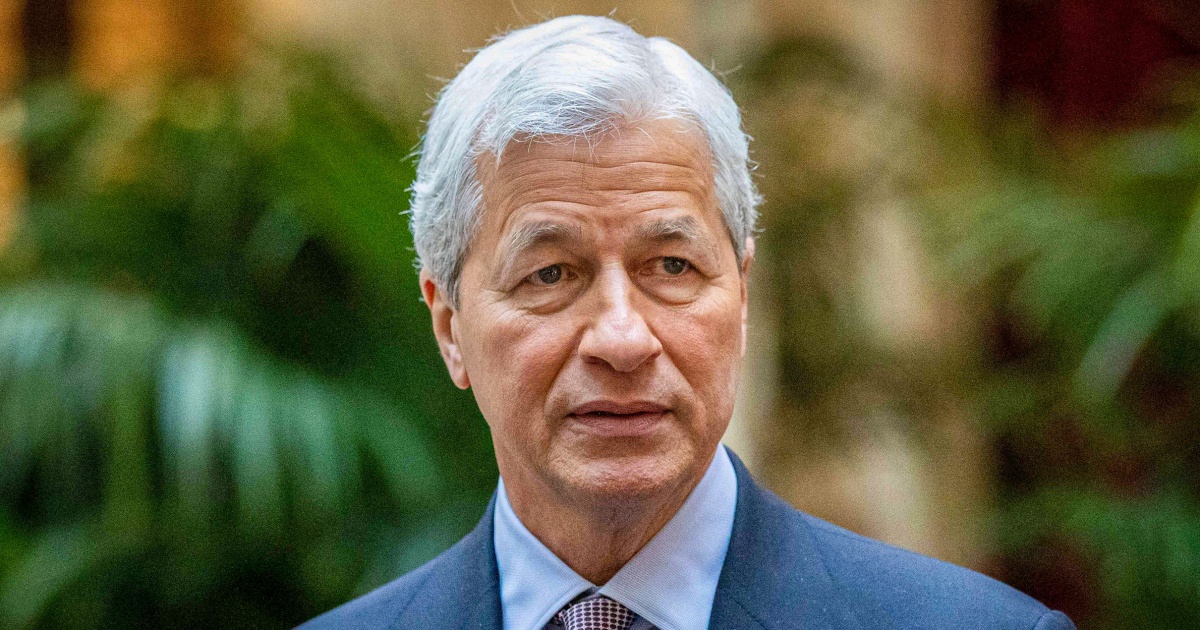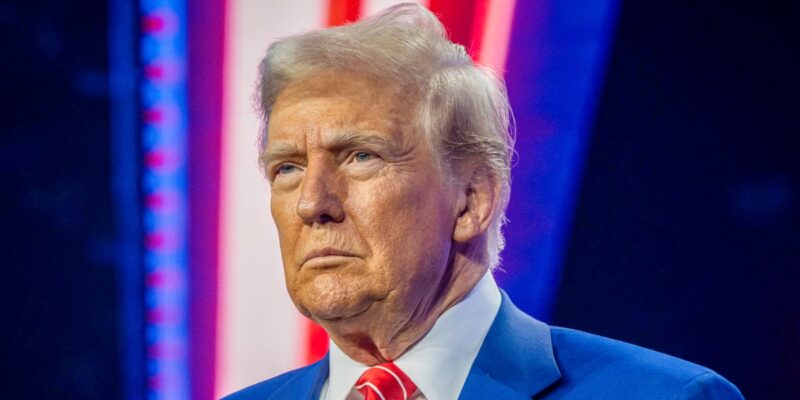
President-elect Donald Trump spent the past two years on the campaign trail making more than a dozen promises about what he would enact on his first day in office.
Trump’s day-one plans are wide-reaching, calling for the mass deportation of undocumented immigrants, sweeping tariffs that economists have warned could have drastic and harmful effects on the U.S. economy and pardons of defendants charged in the attack on the U.S. Capitol on Jan. 6, 2021.
On the first day of his previous term, Trump signed just one executive order, which targeted Obamacare. Here are some of Trump’s most notable day-one promises this time around.
Immigration
Begin a mass deportation program
As he did during his previous campaigns, Trump made immigration the centerpiece of his 2024 pitch, repeatedly vowing to deport undocumented migrants. On Oct. 27, just days before the election, Trump reiterated during a rally in New York City, “On day one, I will launch the largest deportation program in American history to get the criminals out.”
In 2022, the number of undocumented migrants living in the U.S. stood at nearly 11 million according to a federal estimate, though the exact number is unknown. Fewer than 500,000 undocumented immigrants were known to have criminal backgrounds, as of September, Immigration and Customs Enforcement said in a letter to Congress.
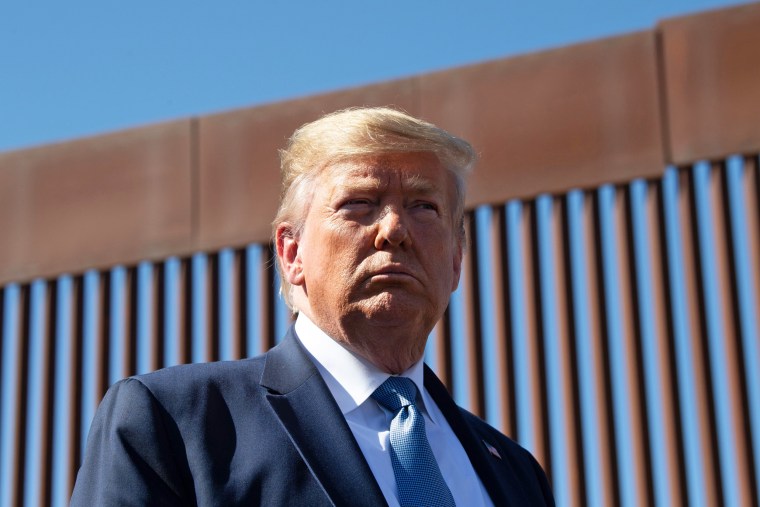
Trump has promised mass deportations.Nicholas Kamm / AFP via Getty Images file
When asked in November about the cost of a mass deportation plan, Trump told NBC News that “it’s not a question of a price tag.” That same month, Trump confirmed a post by another Truth Social user, who wrote that the Trump administration would be “prepared to declare a national emergency and will use military assets” for a deportation program. Trump shared the post, writing, “TRUE!!!”
End birthright citizenship
Anyone who is born in the U.S. is automatically granted citizenship, a right laid out in the 14th Amendment. Trump wants to change it, a logistically difficult operation that would almost certainly lead to legal battles. In a December interview on NBC News’ “Meet the Press,” moderator Kristen Welker asked Trump whether it was still his plan to end birthright citizenship on day one. Trump said, “Absolutely.”
End Biden-era border policies
Trump has issued broad pushback to President Joe Biden’s immigration policies, vowing to use his first day in office to “terminate every open-borders policy of the Biden administration.” Trump also said during a New Hampshire campaign event in October that he would “use Title 42,” a public health law that was implemented toward the start of the Covid-19 crisis and allowed the White House to deport migrants faster. The law was continued partway through the Biden administration but the government stopped using it in 2023.
Democracy
Pardon Jan. 6 defendants
On numerous occasions, Trump has said he would quickly pardon people convicted for their role in the Jan. 6, 2021, attack on the U.S. Capitol. When NBC News’ Welker asked Trump in December about his timeline for pardons, he said, “I’m looking first day.” He went further in an interview with Time magazine published last month, saying, “I’ll be looking at J6 early on, maybe the first nine minutes.” In a January press conference, Trump was asked if he was looking to pardon Jan. 6 defendants who were charged with violent crimes. Trump said, “We’re looking at it,” adding that he intended to make “major pardons.”
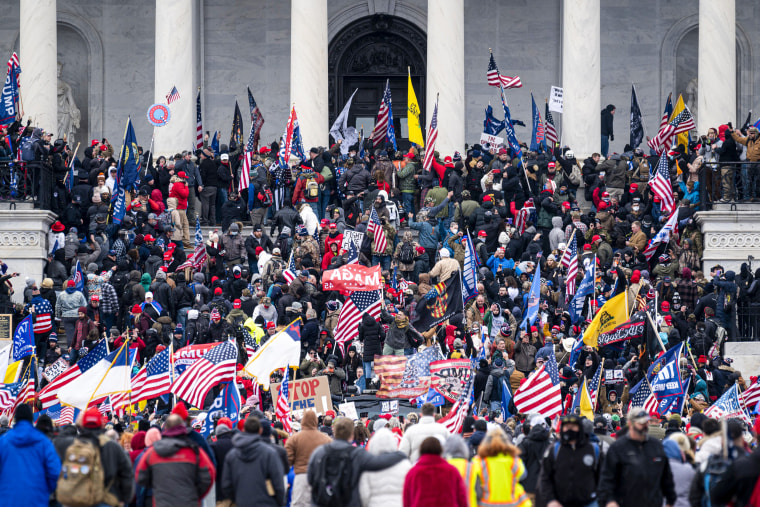
Trump has promised to pardon Jan. 6 defendants.Bill Clark / CQ-Roll Call, Inc via Getty Images file
More than 1,580 defendants have been charged and more than 1,270 convicted in the Jan. 6 investigation, on charges ranging from unlawful parading to seditious conspiracy. There are more than 700 defendants who either received sentences that included no prison time or who have already completed their sentences, meaning Trump could theoretically pardon hundreds of Jan. 6 defendants without much of a practical impact.
Just a handful of Jan. 6 defendants remained detained pretrial at the order of a federal judge, while all other incarcerated Jan. 6 defendants have been sentenced to prison after their conviction, when they either admitted they committed the crimes they were charged with, or when a judge or jury found them guilty beyond a reasonable doubt.
Foreign policy
Ending the war in Ukraine
One of Trump’s most audacious promises was that he could end the war in Ukraine within 24 hours of taking office — or even before.
“That is a war that’s dying to be settled. I will get it settled before I even become president,” Trump said during a September debate with Vice President Kamala Harris in Philadelphia.
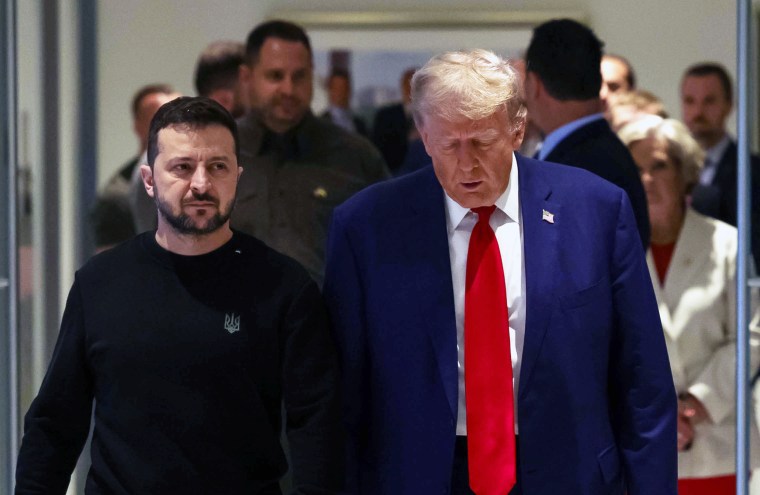
Trump has said he can end the war between Russia and Ukraine in 24 hours.Alex Kent / Getty Images file
“I know [Ukrainian President Volodymyr] Zelenskyy very well, and I know [Russian President Vladimir] Putin very well. I have a good relationship and they respect your president, OK, they respect me. They don’t respect Biden,” Trump added.
During remarks to the press at Mar-a-Lago in January, Trump was asked when he plans to meet with Putin to discuss an end to the Ukraine war. Trump said it would be inappropriate to hold the meeting ahead of his Jan. 20 inauguration.
Economy
Implement tariffs
Weeks after his election, Trump promised that he would sign an executive order to implement a 25% tariff on products imported from Mexico and Canada, two of America’s biggest trading partners.
“On January 20th, as one of my many first Executive Orders, I will sign all necessary documents to charge Mexico and Canada a 25% Tariff on ALL products coming into the United States, and its ridiculous Open Borders,” Trump said in a post on Truth Social on Nov. 25.
Trump had previously proposed 10% tariffs across the board, but his November comments about the two U.S. allies went further. During his campaign, Trump referred to tariffs as “the most beautiful word in the entire dictionary of words.”

Trump has promised to implement a 25% tariff on goods coming from Mexico and Canada.Mauricio Palos / Bloomberg via Getty Images file
Economists have warned that consumers could bear the brunt of sweeping tariffs, which may lead to higher prices. Companies could respond to tariffs by buying a product in the U.S. rather than from another country, or they may raise prices for consumers to offset the cost of the tariff. Alan Deardorff, an economist at the University of Michigan, had previously told NBC News that Trump’s tariffs “are like a sales tax, in the sense that consumers everywhere are going to end up paying.”
Cancel the electric vehicle ‘mandate’
In 2021, Biden signed an order setting a nationwide goal aiming for 50% of new cars and trucks sold by 2030 to be zero-emission. In March, the Environmental Protection Agency finalized tailpipe emission limits, and electric vehicles were expected to help meet the goals. California also has a law dictating that all new car sales in the state be zero-emission by 2035.
Trump has painted them all with a broad brush, referring to them as “electric vehicle mandates,” though no one is required to buy a certain car. In November, at a campaign event in Houston, he reiterated his promise, saying, “The day I take office, I will cancel Crooked Joe’s electric vehicle mandate.”
Drill, drill, drill
One of Trump’s most frequent promises, repeated in almost every campaign speech, is the commitment to increase oil drilling in the United States.
In a town hall interview with Fox News host Sean Hannity in December, Trump said he would not be a dictator “except for day one,” clarifying that he intends to use that authority to “close the border” and “drill, drill, drill” on his first day in office. Trump has routinely claimed increasing U.S. oil production would drastically reduce energy costs.

Trump has promised a renewed effort to “drill, drill, drill.”Luke Sharrett / Bloomberg via Getty Images file
Last month, incoming Trump press secretary Karoline Leavitt told Fox News that he would get to work on this within seconds of arriving in the Oval Office.
Leavitt promised the administration would “expedite permits for drilling and for fracking all over this country so we can immediately bring down the cost of living.”
In 2023, U.S. energy production exceeded consumption by a record amount, according to the U.S. Energy Information Administration.
‘Made in America’ auto industry
Trump said during a rally in September that “a vote for President Trump means the future of the automobile will be made in America.” He forecast that the auto industry would be “fueled by American energy,” “sourced by American suppliers” and built by American laborers. He added, “It’s going to happen, and we’ll do it. First day in office.”
In recent years, major auto companies have laid off thousands of workers, though in January, General Motors and Ford Motor reported their best domestic vehicle sales since 2019.
Transgender rights
Limit participation in women’s sports
Trump has repeatedly referred to transgender women as men, vowing to his supporters that he will ensure transgender women cannot compete in women’s sports. In an October speech in West Palm Beach, he said, “I will keep men out of women’s sports, 100%, immediately, first day.” During the same speech, he vowed to sign an executive order on his first day in office to cut federal funding for schools “pushing critical race theory, transgender insanity and other inappropriate racial, sexual or political content to our beautiful children.”
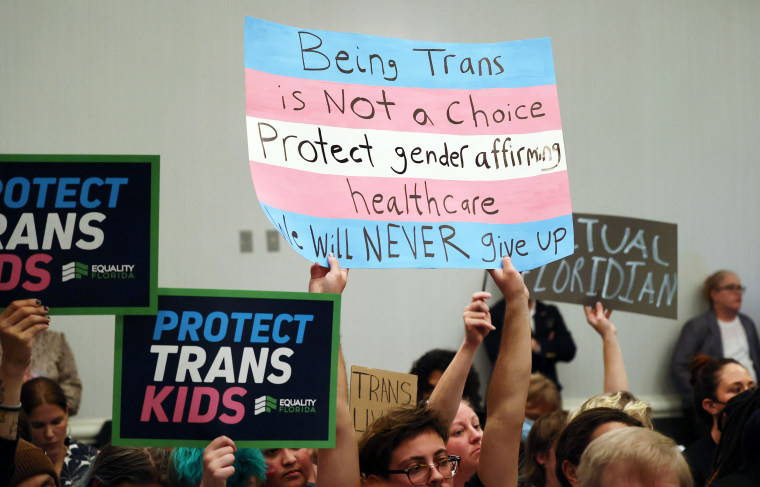
Trump has promised to restrict trans rights.Ricardo Ramirez Buxeda / Orlando Sentinel via Getty Images file
End gender-affirming care practices
Trump has also frequently railed against gender-affirming care, which can include hormone therapy. During the Biden administration, the White House has provided resources and guidance to ensure accessibility and information about the care options. Trump said in a video posted to his campaign website on Feb. 1, 2023, that “on day one, I will revoke Joe Biden’s cruel policies on so-called ‘gender affirming care.’”







